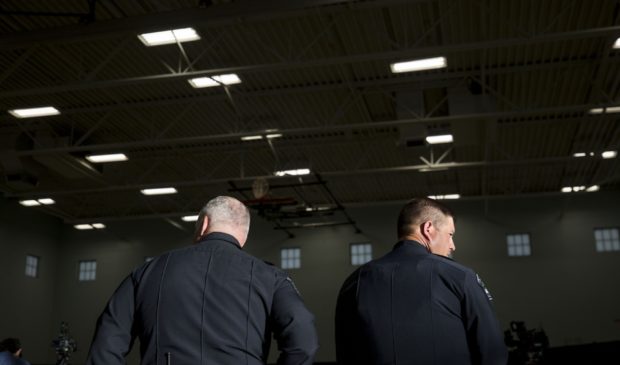Photo by Gabriel C. Pérez/KUT
Bill penalizing Texas cities that cut funding for police heads to governor’s desk
Tuesday, June 1, 2021 by
Audrey McGlinchy, KUT Texas lawmakers on Friday gave final approval to a bill that would financially punish large cities that cut their police budgets, including prohibiting them from raising new property tax revenue. The legislation now heads to Gov. Greg Abbott, who has said he would sign such a bill. If so, the law would go into effect Sept. 1.
“My hope is that we never have to use this bill,” Sen. Joan Huffman (R-Houston), one of the measure’s sponsors, said in response to questions before the Senate vote Monday. “My hope is that all the cities protect their police; don’t defund the police.”
Lawmakers took their final vote on House Bill 1900 nearly a year to the date after a Minneapolis police officer murdered George Floyd and people across the country, including in Austin, began protesting racial injustice. Following the outcry, Austin City Council members voted to cut millions from the police budget.
HB 1900 applies to cities with a population of more than 250,000; lawmakers say that includes 11 Texas municipalities, including Austin, Dallas and Houston.
Under the bill, if a city funds its police department at a level lower than it has for the past two fiscal years it loses its right to raise property taxes more than it did the year before. (Cities will be allowed to ask the governor’s office for permission to reduce their police budgets.)
The bill also outlaws a “defunding municipality” from raising public utility rates or annexing new land, and requires that a city reducing its police budget let residents of neighborhoods annexed in the past 30 years vote to de-annex themselves.
If HB 1900 becomes law, the state will hold back sales tax revenue for cities that cut their police budgets and reappropriate some of that money to the Texas Department of Public Safety.
“The bill is designed to tell municipalities, do not defund the police, and if they do, there are some serious consequences,” Huffman said during debate on the bill.
Gov. Abbott started calling for lawmakers to pass a bill like HB 1900 last summer, the same day Austin cut its police budget.
“Some cities are more focused on political agendas than public safety,” he said in an emailed statement. “Public safety is job one, and Austin has abandoned that duty. The legislature will take this issue up next session, but in the meantime, the Texas Department of Public Safety will stand in the gap to protect our capital city.”
All totaled, Austin City Council reduced the budget by roughly $142 million. Half of that money isn’t going toward anything new; it’s being spent on divisions that were moved out from under police control, like the city’s Forensic Sciences Department.
Council members moved roughly $20 million of the police budget to the city’s pandemic response and housing for those living on the streets, and put another $45 million into a transitionary fund, which Council said it would decide how to spend later. (Since that time, nearly half of that money has gone back to the police department.)
Council members said their vote was in response to thousands of calls from constituents to redistribute money from the police and toward efforts that could reduce the need for police, such as mental health services. It was the first time in at least a decade that the city had not increased the police department’s budget.
“I think this is without a doubt the most significant change in Austin’s public safety priorities in generations,” Council Member Greg Casar said at the time.
While then-Police Chief Brian Manley said he worried what effect the budget cuts would have on staffing, he said he understood that some parts of policing needed to be reevaluated.
Interim Police Chief Joseph Chacon, who replaced Manley when he retired earlier this year, spoke against HB 1900 at a committee hearing in March.
“I’m here today as the chief of police in a city … that the dollar amounts do not always correlate to increased public safety,” Chacon told lawmakers. Experts KUT spoke with agree there is no evidence of a relationship between police spending and crime rates.
Chacon called the bill a legislative “overstep.”
“When we talk about defunding, I think we need to be clear that just because money was moved out of our budget does not mean that whatever that money was responsible for is no longer being done,” he said. “It simply resides in another budget now.”
HB 1900 could result in Austin restoring its police department to 2019 levels, when the city spent $434 million on policing. In a recent memo, Austin’s finance office forecasted a $23 million deficit in the city’s budget for the upcoming fiscal year; this did not account for the financial impact of police funding bills like HB 1900.
“City staff are reviewing the legal framework and its impact on the city budget, and will discuss with Council once the bill is enacted,” Andy Tate, a city spokesperson, wrote in an email.
The Austin Monitor’s work is made possible by donations from the community. Though our reporting covers donors from time to time, we are careful to keep business and editorial efforts separate while maintaining transparency. A complete list of donors is available here, and our code of ethics is explained here.
You're a community leader
And we’re honored you look to us for serious, in-depth news. You know a strong community needs local and dedicated watchdog reporting. We’re here for you and that won’t change. Now will you take the powerful next step and support our nonprofit news organization?











